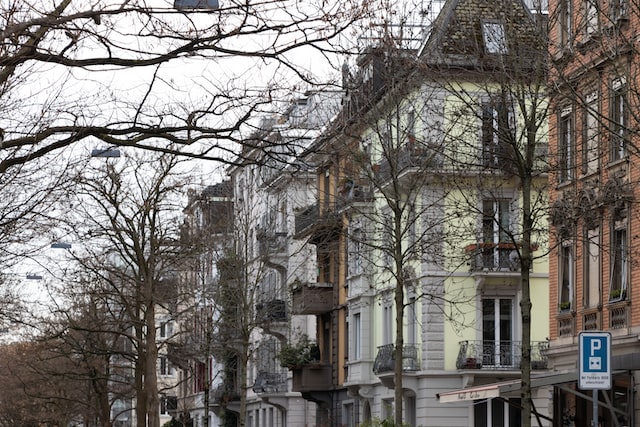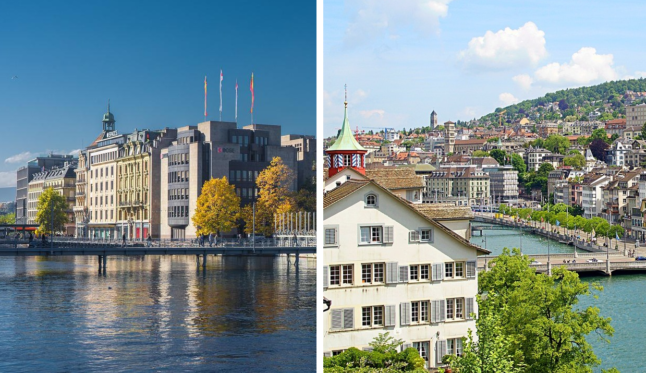While Zurich and Geneva are different in some regards, such as the language spoken there — Swiss-German in the former and French in the latter — the two cities also have some things in common.
For instance, both frequently feature among the most expensive cities to live in various international surveys.
As The Local explained in an article published in December, there are many reasons why Zurich and Geneva are so pricy – and oftentimes more expensive than other Swiss cities – to live in.
READ MORE: Why are major Swiss cities so expensive?
Property prices/rents
Geneva in particular has a complicated housing market — the tiny canton has suffered from an acute housing shortage for many years, with demand far outstripping supply.
One of the reasons for the shortage of apartments and, consequently high rents, have to do with Geneva’s geography and demographics.
The canton is nestled in the southwest corner of the country, where it is wedged between France and Lake Geneva. The land for new constructions is limited, while the demand is growing steadily along with the population.
The situation is not much rosier in Zurich where the affordable housing shortage remains a topic of concern for residents.
READ MORE: Zurich residents concerned about being ‘pushed out’ of city
In the city, the average net rents per month for all existing tenancies, the so-called existing rents, are above the national average in almost all regions and for every apartment size.
According to the Federal Statistical Office, the average net rent in 2021 – regardless of size – was 1,393 at national level.
The average rent in both Zurich (1,628 Swiss francs) and Geneva (1,484 Swiss francs), however, surpassed the national average rent level.
Still, Zurich tenants may be able to save money in the long run by sticking with one apartment.

Health insurance premiums
It is a well-known fact that health insurance premiums across Switzerland are higher than in most other European countries.
This is particularly true in Geneva, which has some of the highest premiums for mandatory health insurance in Switzerland. However, Zurich isn’t far behind.
According to data collected by Moneyland over 2022, individuals aged 26 and over in the canton of Zurich pay a monthly premium of 338.- Swiss francs on average, while those living in the canton of Geneva pay 479 Swiss francs.
Taxes
The amount of tax you pay in Switzerland depends on a few factors, including where you live.
Taking that into account, choosing between Zurich and Geneva can (and will) have an impact on your wallet – however, there is a flip side to choosing a larger city with a heftier price tag. In Switzerland, it is usually the case that public services will be better in areas with a higher tax rate.
READ MORE: Where in Switzerland has the lowest and highest taxes
A comparison of the 2022 income tax rates across all 26 Swiss cantons by Statista shows that the canton of Geneva leads the chart with the highest income tax rate at 44.75 percent, followed by the cantons of Basel-Country, Vaud, Bern, Basel-City, and Ticino.
The canton of Zurich comes in 7th place with an income tax rate of 39.63 percent. You can also read more about the parts of Zurich with the highest income tax rates in our article on the topic.
Wining and dining
While groceries are around the same cost across Switzerland, the same can’t be said for eating out.
So, how do Zurich and Geneva compare?
Well, first the good news.
According to a report by Swiss news portal Nau, you can still buy a beer in Zurich for under 4 Swiss francs in the Rheinfelden Bierhalle in Zurich Niederdorf, for instance.
Not bad when one considers the average Swiss person drinks about 58 litres of beer a year.
If you’re in Geneva – which is frequently crowned the city with the most expensive beer – a pint can set you back as much as 10 Swiss francs.
But it’s not all bad news for Geneva.

If you’re looking to combine your pint with a hearty Doner kebab – a favourite cheat meal of the Swiss – you only have to dish out some 8 to 9 francs in Geneva, while Zurich stalls will charge up to 12 francs per Doner kebab.
READ MORE: Zurich versus Geneva: Which Swiss city is better for job seekers?
Public transport
The canton of Geneva combines its three most important transport companies under the unireso fare network. The latter is made up of a single zone – the Zone 100 Tout Genève – covering all of canton Geneva.
Travellers purchasing a daily travelcard for all Geneva zones will pay 3 Swiss francs for 2nd class travel and 5.40 Swiss francs for 1st class.
Meanwhile, a monthly travelcard for 2nd class travel costs 70 Swiss francs, while 1st class travel costs 119 Swiss francs.
While this may seem steep for some, travelling in Zurich – Switzerland’s largest city – comes at a higher cost.
Travellers in Zurich will need to purchase the NetworkPass to travel in its 5 zones.
If you need to travel across Zurich’s 5 zones for work or leisure reasons, note that a monthly 2nd class travelcard will cost you 175 Swiss francs. To travel Zurich’s 5 zones throughout the year in 2nd class you will need to pay 1,610 Swiss francs.
Moreover, you have the option of buying the 24h-Ticket to travel Zurich, well, for 24 hours.
All zones in this case will cost you, an adult, 34.40 Swiss francs (2nd class), and children between the ages of 6 and 15 will be paying 17.20 Swiss francs (2nd class).
Should you, however, only wish to travel a local network and stick to one municipality, you will only be paying 37 Swiss francs per month, or a yearly 340 Swiss francs to do so.



 Please whitelist us to continue reading.
Please whitelist us to continue reading.
Member comments